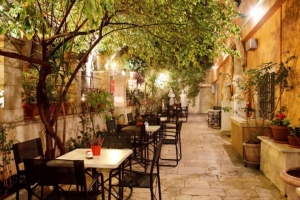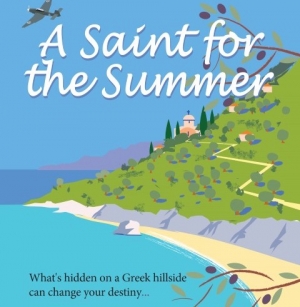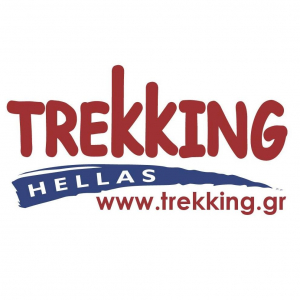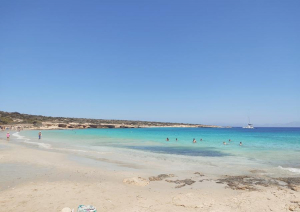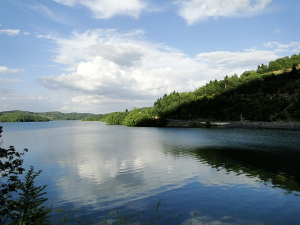BUSINESS CENTRE
XpatAthens
Monday, 18 September 2017 10:08
The Best Courtyard & Rooftop Bars In Central Athens
With the Athens bar scene growing significantly in the last few years, Athens Coast dives into the nightlife and gives us the inside scoop on the best courtyard and rooftop bar experiences!
Located on the roof of the Central Hotel in Plaka, this is Athens Coast’s go-to. “I like this place because it is never over-crowded and the service is friendly and attentive. Also, after a few cocktails, when the lights shine on the sides of the Acropolis, you can see the outline of a goat’s head.”
A hidden boutique hotel with a roof terrace over-looking Acropolis. The Zillers popped onto the scene recently and is on all of the trendy ‘Athens is the new (insert cool city here)’ lists.
This hostel has one of the highest rooftop bars in Athens, so you can see Acroplis and Mount Lycabettus. In the elevator on the way up, you will see a sign that reads, “No we don’t have wifi, get drunk and talk to each other.”
Please click HERE For more rooftop bars!
As it is the official bistro for the Museum of the City of Athens, the Black Duck is the classiest joint on my list. Take a stroll through history and enjoy a coffee in the garden of the first palace in Athens. Black Duck is open year round, with the outdoor courtyard open Spring-Fall.
A renovated shopping alleyway on Kolokotroni has become an industrial, hip hang-out. Food, coffee, juices, cocktails- you name it, they have it.
Please click HERE for more courtyard bars!
To read this article in full, please visit: Athens Coast
Photo Credit: Athens Coast
Published in
Pubs, Bars & Cafes
Tagged under
Tuesday, 01 May 2018 09:53
'A Saint For Summer' By Marjory McGinn
What’s hidden on a Greek hillside can change your destiny …
Edinburgh journalist Bronte McKnight is summoned to a hillside village in the wild and beautiful Mani region of Greece by her estranged expat father Angus to help him with a medical problem. But she soon discovers that Angus, whom she has barely seen in 10 years, has lured her there with a tougher challenge in mind – solving a mystery from the Second World War when his father disappeared in Greece during the disastrous Battle of Kalamata, ‘Greece’s Dunkirk’.
Edinburgh journalist Bronte McKnight is summoned to a hillside village in the wild and beautiful Mani region of Greece by her estranged expat father Angus to help him with a medical problem. But she soon discovers that Angus, whom she has barely seen in 10 years, has lured her there with a tougher challenge in mind – solving a mystery from the Second World War when his father disappeared in Greece during the disastrous Battle of Kalamata, ‘Greece’s Dunkirk’.
With the country gripped by economic crisis, and the clock ticking against them, their near-impossible quest to discover how and where Kieran McKnight died, takes them from Kalamata to a remote mountain village where its few remaining inhabitants are bound by old traditions and secrecy. As the tensions of their own fractured relationship rise, Bronte and Angus are helped in their search by a cast of intriguing Greek characters, especially charismatic doctor, Leonidas Papachristou. He has a pivotal role, not least in challenging Bronte’s assumption that she hasn’t the time nor the courage to fall in love in Greece.
The secrets unearthed by Angus and Bronte will be painful and astonishing. This is a compelling tale of heroism, faith, and love - with a heart-warming conclusion.
About The Author
Marjory McGinn is a Scottish-born author and journalist, brought up in Australia. She worked in Scotland for 10 years from 2000 as a freelance feature writer. Her journalism has appeared in leading newspapers in Britain and Australia, including The Daily Mail, The Times, The Telegraph; and The Scotsman, The Herald. In Australia she was a senior feature writer on The Sun-Herald, and stories have appeared also in The Australian and The Age.
Marjory McGinn is a Scottish-born author and journalist, brought up in Australia. She worked in Scotland for 10 years from 2000 as a freelance feature writer. Her journalism has appeared in leading newspapers in Britain and Australia, including The Daily Mail, The Times, The Telegraph; and The Scotsman, The Herald. In Australia she was a senior feature writer on The Sun-Herald, and stories have appeared also in The Australian and The Age.
A youthful work/travel year in Athens inspired a lifelong fascination for Greece. In 2010, together with her partner Jim and their Jack Russell dog, Wallace, she set off from Scotland on an adventure to the southern Peloponnese that lasted four years and was the basis for her three travel memoirs (Things Can Only Get Feta, Homer’s Where The Heart Is and A Scorpion In The Lemon Tree.
For more information on McGinn and her other books, please visit: Big Fat Greek Odyssey
Published in
Books
Tagged under
Tuesday, 08 October 2019 20:39
October 8 - Instant Gratification At Its Best
Greece does not only have breathtaking beaches and landscapes, but also a great variety of mouth-watering food! If you're in the capital, don't miss our recommendations for the top street food and sandwich spots in town. And of course, the best places for coffee lovers!
Please click HERE to view this issue of our newsletter!
Published in
Newsletters
Tagged under
Tuesday, 14 April 2020 13:05
How To Celebrate Greek Easter 2020 At Home
Easter is one of the most important Christian holidays and the biggest religious holiday in Greece; it is a time to celebrate faith, new life and family gatherings.
This year, however, things are going to be a little different, as social distancing measures prevent families from gathering around the table on Easter Sunday for lunch and attending church services. Yet, this, of course, doesn’t mean Easter is canceled. It just means that our holiday routine needs some refreshing!
This year, however, things are going to be a little different, as social distancing measures prevent families from gathering around the table on Easter Sunday for lunch and attending church services. Yet, this, of course, doesn’t mean Easter is canceled. It just means that our holiday routine needs some refreshing!
Our friends at MILI LO Design & Event Planning have put together these really great tips to help us make the most of our Greek Easter 2020 in isolation.
This article was originally published on MILI LO's blog here. Mili Lo is a boutique event design and planning company located in Athens. Emily and her team are exceptionally creative and make life's precious moments absolutely magical. Thank you for sharing this article with us and for brightening our Easter in Greece 2020!
This article was originally published on MILI LO's blog here. Mili Lo is a boutique event design and planning company located in Athens. Emily and her team are exceptionally creative and make life's precious moments absolutely magical. Thank you for sharing this article with us and for brightening our Easter in Greece 2020!
1. Prepare & Share Traditional Recipes
Food is often the main focus of holiday festivities, especially in Greece, a country with a rich gastronomic tradition! From tsoureki, the traditional Easter bread, to magiritsa soup, and of course, ovelias, the Greek Easter tradition where a whole lamb is roasted on a spit; find recipes for your favorite Greek Easter holiday foods and spend some quality time in the kitchen with your closest ones. To make things more interesting, you can make it a family affair and have all your family members try creating the same dishes in their own kitchens!
Food is often the main focus of holiday festivities, especially in Greece, a country with a rich gastronomic tradition! From tsoureki, the traditional Easter bread, to magiritsa soup, and of course, ovelias, the Greek Easter tradition where a whole lamb is roasted on a spit; find recipes for your favorite Greek Easter holiday foods and spend some quality time in the kitchen with your closest ones. To make things more interesting, you can make it a family affair and have all your family members try creating the same dishes in their own kitchens!
2. Throw A Virtual Easter Egg Hunt
The egg hunt is one of the most popular Eastertide games and, although it’s not a typical Greek tradition, it can be a reason for children to look forward to Easter and have fun even while they are stuck indoors! To host a virtual hunt, hide eggs around your house or yard in places that would be easy to see on FaceTime or Zoom and then invite the youngest members of your family to participate. When they find an egg, pick it up and award the child a point. At the end of the game, count each child’s points and have their parents give them treats, one for each point they scored!
3. Tune In To Online Church Services
Many churches are now taking their services online so you can attend from the comfort of your home. See if your church organizes any special virtual Easter events and after the service set up a call to share the message of Easter with your loved ones!
4. Create Your Own Dye for Easter Eggs
In Greece, dying red eggs is a long-standing tradition that takes place each year on Holy Thursday. This year, however, try taking it one step further by decorating and designing colorful eggs with cool patterns - all on your own! Instead of running to the grocery store to buy a fancy dye kit, try creating your own with what you already have in your pantry and the help of your family. All you need is boiling water, eggs, vinegar, and food coloring. Let the Easter egg dyeing begin!
5. Make An Easter Basket
Design a colorful basket, fill it with all kinds of goodies, from chocolate bunnies to pastel-colored eggs, and then leave it on a neighbor’s doorstep. This delicious gift will give a smile to anyone who receives it! After all, what greater way to fully embrace the Easter spirit than with random acts of kindness!
6. Get Creative With Sidewalk Chalk
Continue spreading the love by writing cheerful messages on the sidewalk to brighten your neighbors’ day! Chances are your neighbors are feeling stressed out and cooped up these days and they could use a glimmer of hope and optimism. You can also draw some colorful Easter eggs or bunnies for them to find the next time they pass by.
7. Show Your Support To Healthcare Workers
In times like these, we shouldn't forget the doctors and nurses who are working through the holidays, risking their lives and sacrificing time with their families to care for patients. You can show your appreciation and gratitude with a small gesture such as tying a white ribbon somewhere in your front yard or sharing a thankful message on social media with the hashtag #HealthCareHeroes.
8. Have A Virtual Easter Dinner
8. Have A Virtual Easter Dinner
While some families are awaiting Easter lunch with great anticipation to break up the monotony of their quarantine routine, others who are alone this year need to come up with ideas to bridge the distance. Luckily, technology makes staying connected easier. Even if you can’t gather in person you can still celebrate and have a special dinner with your loved ones over Zoom, Facetime, or other video conferencing apps. Don’t forget to include the elderly as they need to feel involved and loved more than anyone!
While no one could have imagined that Greek Easter 2020 would be celebrated indoors without traditional outdoor festivities and gatherings, with a little bit of creativity we can still find ways to fill our holiday with color and joy, honoring our favorite traditions, or even inventing new ones! A change in plans doesn’t mean the deeper meaning of Easter has to change too.
Happy Easter from our homes to your homes! #StayHome #StayPositive #StaySafe
Published in
Greek Traditions
Tagged under
Thursday, 13 May 2021 11:57
Trekking Hellas
Trekking Hellas Group of Companies is the largest and most distinguished outdoor tour operator in Greece. In its 35 years of existence, it has established an outstanding reputation in Greece as well as worldwide, by providing high quality services for individuals and groups in the sector of outdoor holidays, activities and events in Greece.
Trekking Hellas Group of Companies consists of 17 franchise companies and employs more than 120 people all over the country. Our extended network makes it possible to operate an array of activities and experiences in all corners of Greece, at the highest standards, in cooperation with trained guides and various local suppliers. We organize outdoor activities in classic touristy destinations (i.e.Santorini, Athens ,Crete, Rhodes etc) as well as in less known regions of Greece (Tzoumerka, Karpenisi etc), off the beaten path, aiming to support local communities and contribute to their more sustainable development. The concept of meaningful and respectful travel lies in the heart of our endeavors.We strongly embrace and implement a socially and environmentally responsible policy by promoting the protection of nature and environmental awareness. We strive to educate and make a positive impact in this corner of the world.
On our company profile section you can read about each franchise company belonging to the group of companies, our enthusiastic and passionate guides and our headquarters team. Trekking Hellas is a founding member of HATEOA, memberor of ATTA and SETE and participates actively in the development and promotion of the adventure travel industry in Greece. It is also member and ambassador in Greece of the Adventure Travel Trade Association
Trekking Hellas Group of Companies consists of 17 franchise companies and employs more than 120 people all over the country. Our extended network makes it possible to operate an array of activities and experiences in all corners of Greece, at the highest standards, in cooperation with trained guides and various local suppliers. We organize outdoor activities in classic touristy destinations (i.e.Santorini, Athens ,Crete, Rhodes etc) as well as in less known regions of Greece (Tzoumerka, Karpenisi etc), off the beaten path, aiming to support local communities and contribute to their more sustainable development. The concept of meaningful and respectful travel lies in the heart of our endeavors.We strongly embrace and implement a socially and environmentally responsible policy by promoting the protection of nature and environmental awareness. We strive to educate and make a positive impact in this corner of the world.
On our company profile section you can read about each franchise company belonging to the group of companies, our enthusiastic and passionate guides and our headquarters team. Trekking Hellas is a founding member of HATEOA, memberor of ATTA and SETE and participates actively in the development and promotion of the adventure travel industry in Greece. It is also member and ambassador in Greece of the Adventure Travel Trade Association
Published in
Travel & Experiences
Tagged under
Tuesday, 27 July 2021 00:45
Seas The Day
Seas the day and make the most out the ultimate Greek summer experience!
Please click HERE to view this issue of our newsletter!
Published in
Newsletters
Tagged under
Wednesday, 09 March 2022 07:00
Greece Takes More Actions To Ensure Accessible Destinations
Greece took one more step towards making destinations accessible to people with disabilities following a recent agreement between Tourism Minister Vassilis Kikilias and the National Confederation of Persons with Disabilities (ESAmeA).
Under the protocol of cooperation, the ministry and ESAmeA commit to a series of initiatives including the provision of comprehensive accessibility information, the inclusion of relevant curriculum at tourism schools on all levels, the development of education and training programs for people with disabilities in tourism professions and support actions for their employment and inclusion in the labor market.
Speaking in February during a special committee, ESAmeA President Ioannis Vardakastanis had said efforts were being made to host the Annual General Assembly (AGA) of the European Disability Forum (EDF) in Athens in June. However, Vardakastanis said the confederation, which this year presides over the assembly, was finding it difficult to find 20 accessible rooms “despite the plethora of expensive 5-star hotels”.
Vardakastanis went on to stress that an agreement with tourism stakeholders was crucial in order to make accessible tourism a priority with specific results-oriented time-frames and targets that will ensure accessibility onboard ships, tourist buses, at hotels, on mass transport, on beaches, and at archeological sites, “and to ensure these works are reliable consistent,” he said.
Earlier this year, Kikilias said establishing Greece as an accessible tourism destination was a ministry priority, adding that the focus was now on turning words into actions and “giving people with disability the chance to participate wholly and equally in the tourism chain”.
To read this article in full, please visit: news.gtp.gr
Under the protocol of cooperation, the ministry and ESAmeA commit to a series of initiatives including the provision of comprehensive accessibility information, the inclusion of relevant curriculum at tourism schools on all levels, the development of education and training programs for people with disabilities in tourism professions and support actions for their employment and inclusion in the labor market.
Speaking in February during a special committee, ESAmeA President Ioannis Vardakastanis had said efforts were being made to host the Annual General Assembly (AGA) of the European Disability Forum (EDF) in Athens in June. However, Vardakastanis said the confederation, which this year presides over the assembly, was finding it difficult to find 20 accessible rooms “despite the plethora of expensive 5-star hotels”.
Vardakastanis went on to stress that an agreement with tourism stakeholders was crucial in order to make accessible tourism a priority with specific results-oriented time-frames and targets that will ensure accessibility onboard ships, tourist buses, at hotels, on mass transport, on beaches, and at archeological sites, “and to ensure these works are reliable consistent,” he said.
Earlier this year, Kikilias said establishing Greece as an accessible tourism destination was a ministry priority, adding that the focus was now on turning words into actions and “giving people with disability the chance to participate wholly and equally in the tourism chain”.
To read this article in full, please visit: news.gtp.gr
Published in
Local News
Tagged under
Friday, 29 December 2023 07:00
5 Great Greek Destinations To Visit This January
Greece may be known as a summer destination, boasting a unique coastline with numerous islands and drop-dead gorgeous sun-kissed beaches. Its natural beauty, though, goes far beyond just that.
Let's take a look at 5 beautiful destinations for a winter escape in Greece!
Mountainous Nafpaktia
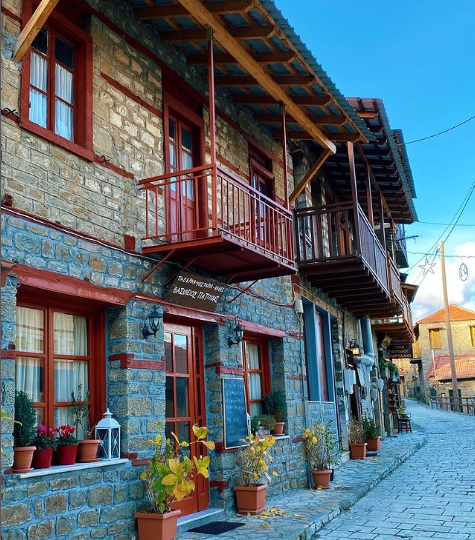
Credit: @georgia_damaskou
Let's take a look at 5 beautiful destinations for a winter escape in Greece!
Mountainous Nafpaktia

Credit: @georgia_damaskou
Nature lovers and adventure seekers will fall in love with mountainous Nafpaktia. Nafpaktos town features many attractions, with the well-preserved castle standing out from the rest. What will totally blow your mind, though, are the mountain villages in the area, especially Elatou and Ano Chora, hidden away in dense forests with chestnut trees. It's been on our travel list for years, but it still manages to stay off the beaten path and retain its traditional character.
Make sure to: Pay a visit to a localtsipouradiko and try an adventurous sport like rafting or mountain biking!
Trikala
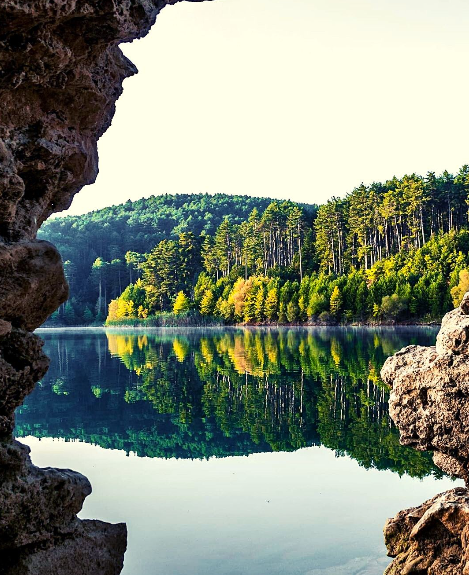

If winter destinations near Attica had a king, it would undoubtedly be Trikala in Corinth, located just 2 hours away from the capital. Blessed with imposing mountains, beautiful lakes, and extraordinary natural beauty, Trikala combines modern comforts, like hotels and luxurious chalets, with the most scenic landscapes. It’s a family-friendly destination that's also popular among skiers and snowboarders, with the Ziria Ski Resort just a breath away.
Make sure to: Try the special grilled ribs at a local tavern and go skiing at Ziria Ski Resort!
Plastira Lake
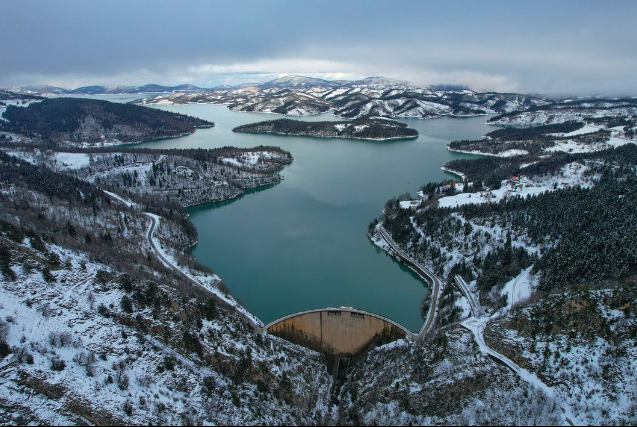
Credit: @antonios_papagiannopoulos

Credit: @antonios_papagiannopoulos
Perhaps the most beautiful sunset in mountainous Greece—regardless of the 340 kilometers one must travel to enjoy this magical moment when the sun disappears behind the Agrafos peaks, the fjords darken, and the lake waters turn an eerie blue color. The lake is surrounded by a whopping 18 picturesque villages, each with unique beauty. The most famous of them is probably Neochori and the views from there are simply breathtaking.
Make sure to: Visit Agnanti Restaurant, the perfect spot to watch the sunset, and go canoe-kayaking!
Metsovo
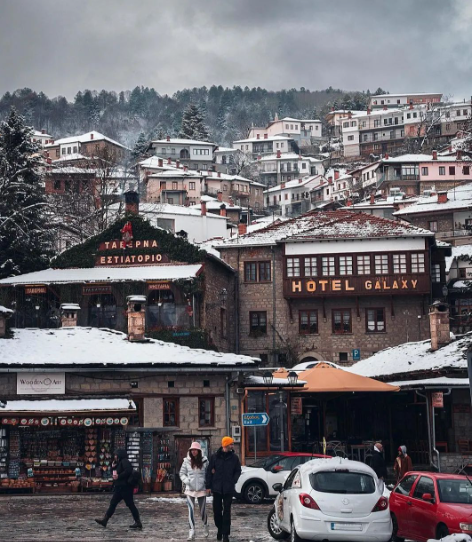
Credit: @alkis_dimos

Credit: @alkis_dimos
Amphitheatrically built on one of the mountain peaks of the mighty Pindus, Metsovo is the perfect blend of mountainous beauty and traditional Greek character. Folklore and living traditions coexist harmoniously; they support each other and somehow create an authentic whole. Among the must-visit places are the art gallery, the park of Agios Georgios, a grove with all kinds of trees found in Pindos, the cheese factory, and the winery of Averof.
Make sure to: Visit the historic monastery of Agios Nikolaos, which has frescoes from the 17th century!
Grevena
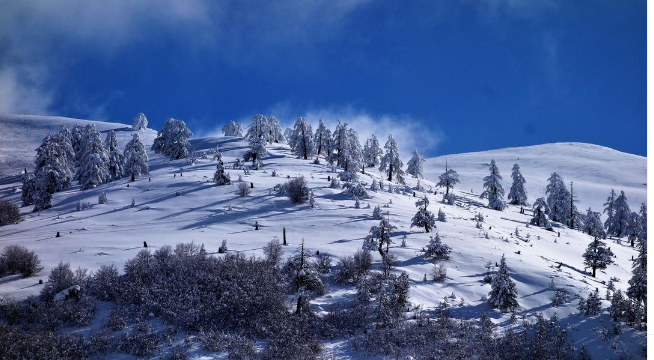
Credit: Thanos Stoupas

Credit: Thanos Stoupas
Dense forests, with mainly beech but also black pine and robola, cover the slopes of the mountains. The most beautiful of the surrounding settlements is Spilaio, where, just a few kilometers outside the village, you will also find the bridge of Portitsa guarding the narrow passage of a gorge. The village of Kalloni is a well-kept secret of jaw-dropping beauty (Angelopoulos had previously used it as a setting in one of his films), but the road network is not good.
Make sure to: Visit the ski resort and, if you make it that far, why not pay a visit to Ioannina close by!
Published in
Travel Greece
Tagged under
Tuesday, 19 March 2024 07:00
Exploring Greek Cinema: Modern-Day Must-Watch Movies
Greek cinema has witnessed a renaissance in recent years, offering audiences a diverse array of captivating stories that reflect the complexities of modern Greek society.
From historical dramas to contemporary romances, here are some Greek films from the past decade that are definitely worth your time!
1. Little England" (2013)
Director: Pantelis Voulgaris
Starring: Penelope Tsilika, Sofia Kokkali, Aneza Papadopoulou, Maximos Moumouris
Director: Pantelis Voulgaris
Starring: Penelope Tsilika, Sofia Kokkali, Aneza Papadopoulou, Maximos Moumouris
This captivating period drama is set on the picturesque island of Andros in the 1930s. The film intricately explores the lives of the inhabitants of a small island community, delving into themes of love, betrayal, and familial duty. Penelope Tsilika delivers a mesmerizing performance as Orsa, a young woman torn between tradition and desire in a society dictated by societal norms.
2. Worlds Apart (2015)
Director: Christoforos Papakaliatis
Starring: J.K. Simmons, Christophoros Papakaliatis, Andrea Osvárt, Maria Kavoyianni, Minas Hatzisavvas
Directed by Christoforos Papakaliatis, "Worlds Apart" interweaves three distinct narratives that explore love, connection, and cultural differences in contemporary Greece. Through its ensemble cast and thought-provoking storyline, the film offers a reflection on the complexities of human relationships in an increasingly globalized world.
3. Roza of Smyrna (2016)
Director: George Kordellas
Starring: Tasos Nousias, Leda Protopsalti, Evgenia Dimitropoulou, Yilmaz Gruda, Yulika Skafida
Spanning across time and space, "Roza of Smyrna" narrates a captivating tale that intertwines the lives of characters in Izmir in 1922 and Athens in 1987. Director George Kordellas skillfully navigates between these timelines, unraveling a story of secrets, love, and the enduring power of the past. Lida Protopsalti delivers a mesmerizing performance as Roza, a woman with a hidden past that resurfaces through the pursuit of an old love.
4. The Other Me (2016)
Director: Sotiris Tsafoulias
Starring: Pigmalion Dadakaridis, Dimitris Katalifos, François Cluzet, Kora Karvouni, Giorgos Chrysostomou
"The Other Me" is a gripping psychological thriller about the dark recesses of the human mind. The film follows the journey of a man grappling with identity and reality after a traumatic event leaves him questioning his own existence and a criminology professor who attempts to solve several murders, with only a series of Pythagoras quotes providing the elusive link between them.
5. Kazantzakis (2017)
Director: Yannis Smaragdis
Starring: Odysseas Papaspiliopoulos, Marina Kalogirou, Thodoris Atheridis, Nikos Kardonis
Directed by Yannis Smaragdis, "Kazantzakis" offers a captivating exploration of the life and legacy of the renowned Greek writer Nikos Kazantzakis. Through brilliant performances and breathtaking cinematography, the film delves into the complex psyche of Kazantzakis, portraying his struggles, passions, and literary genius.
6. Eftyhia (2019)
Director: Angelos Frantzis
Starring: Katia Goulioni, Karyofyllia Karabeti, Thanos Tokakis, Evagelia Siriopoulou, Evgenia Samara
Following the journey of Eftyhia Papagiannopoulou, a young woman who flees the burning of Smyrna and rises to prominence as a celebrated lyricist in Athens, this film celebrates her resilience and artistic legacy.
7. Smyrna, My Beloved (2021)
Director: Grigoris Karantinakis
Starring: Mimi Denissi, Leonidas Kakouris, Burak Hakki, Krateros Katsoulis, Tamila Koulieva
Set during the occupation of Smyrna in 1922, this gripping film chronicles the experiences of the wealthy Greek Baltatzis family amidst the turmoil of the Greco-Turkish War. As the Turkish army inflicts atrocities upon the local Greek and Armenian populations, the Baltatzis family grapples with the harsh realities of war and the subsequent exodus of Smyrna's ethnic Greeks.
8. Murderess (2023)
Director: Tasos Boulmetis
Starring: Karyofyllia Karabeti, Penelope Tsilika, Georgianna Dalaras, Elena Topalidou
Set on the remote island of Skiathos circa 1900, "Murderess" is a gripping adaptation of the classic work by Alexandros Papadiamantis. The tragic story revolves around Hadoula, a woman ensnared in the suffocating grip of her mother's rejection and the oppressive constraints of a patriarchal society.
Published in
Greek Language & Culture
Tagged under
Wednesday, 27 November 2024 22:27
VIP Santorini Premium Transfer & Tour
At VIP Santorini Premium Transfer & Tour, we redefine luxury travel experiences on the stunning island of Santorini. Established in 2015, our fully licensed travel company is dedicated to delivering unparalleled service that goes above and beyond our clients’ expectations.
Beyond mere transfers, we specialize in crafting bespoke tours tailored to your preferences, ensuring your Santorini experience is nothing short of extraordinary. Explore the island in a unique and immersive way, soaking in every moment amidst the awe-inspiring vistas of magical Santorini.
Our team of private VIP Drivers and Chauffeurs embodies professionalism, discretion, and a deep understanding of Santorini’s rich history and culture. With their extensive knowledge, they are equipped to answer all your questions and provide insider insights into the island’s hidden gems.
At VIP Santorini, our mission is to curate unforgettable holiday experiences for our valued clients. We understand that your time is precious, which is why we strive to provide hassle-free vacations that allow you to fully enjoy all that Santorini has to offer.
Trust us with your journey, and let us create memories that will last a lifetime. Welcome aboard, and embark on a magical journey with our exclusive VIP services!
Website: viptransferssantorini.com
Facebook: VIP Santorini
Email: viptransferssantorini@gmail.com
Website: viptransferssantorini.com
Facebook: VIP Santorini
Email: viptransferssantorini@gmail.com
Published in
Featured Greek Businesses
Tagged under


